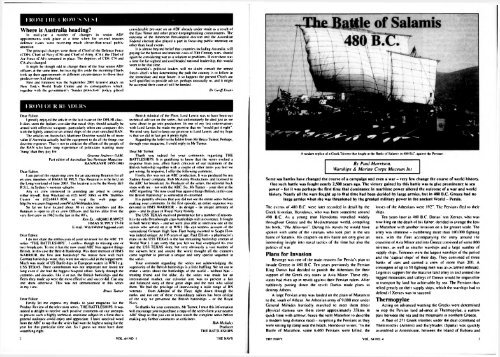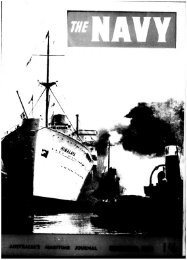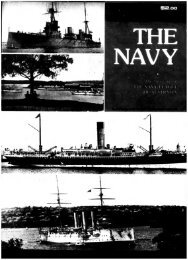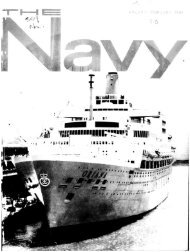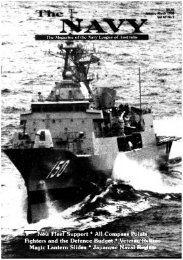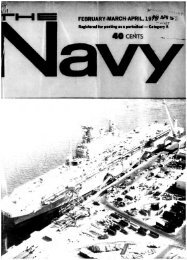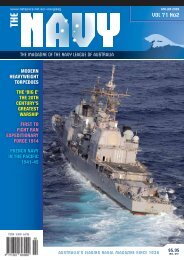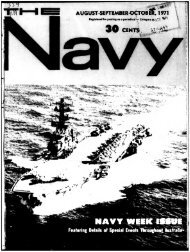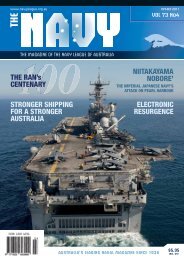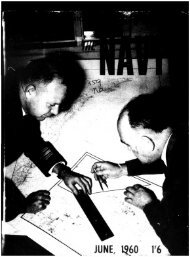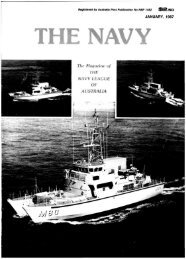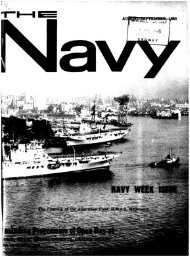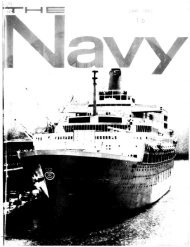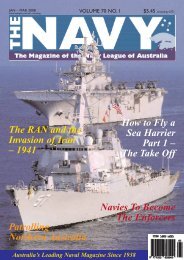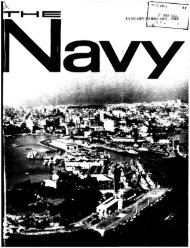The Navy Vol_64_Part2 2002 - Navy League of Australia
The Navy Vol_64_Part2 2002 - Navy League of Australia
The Navy Vol_64_Part2 2002 - Navy League of Australia
Create successful ePaper yourself
Turn your PDF publications into a flip-book with our unique Google optimized e-Paper software.
FROM llll( ROW'S M SIWhere is <strong>Australia</strong> heading?In mid-year a number <strong>of</strong> changes in senior ADFappointments took place at a time when for several reasonsdefencc issues were receiving much closcr-than-usual publicattention.<strong>The</strong> principal changes were those <strong>of</strong> Chief <strong>of</strong> ihe Defence Force(CDF). Chief <strong>of</strong> <strong>Navy</strong> (CN) and Chief <strong>of</strong> Army (CA»: the Chief <strong>of</strong>Air Force (CAF) remained in place. <strong>The</strong> deputies <strong>of</strong> CDF. CN andCA also changed.It might be though txld to change three <strong>of</strong> the four senior ADF<strong>of</strong>ficers at the same time, but leaving this aside the incoming Chiefstook up their appointments in different circumstances to those theirpredecessors had inherited.First and foremost was ihe September 2001 terrorist attack onNew York's World Trade Centre and its consequences which,together wilh ihe government's "border protection" policy, placedconsiderable pressure on an ADF already under strain as a result <strong>of</strong>the East Timor and other peace-keeping/making commitments. <strong>The</strong>outcome <strong>of</strong> the American Presidential election and the <strong>Australia</strong>nFederal election also played a part in focussing public attention onother than local events.Il is almost beyond belief that countries including <strong>Australia</strong>, stillpaying for the human and material costs <strong>of</strong> 2(Hh Century wars, shouldagain be considering war as a solution lo problems, if ever there wasa time for far-sighted and cool headed national leadership, this wouldseem to be thai time.<strong>Australia</strong>'s political leaders will no doubt consult the armedforces chiefs when determining the path the country is to follow inthe immediate and near future: it so happens the present Chiefs arewell qualified to provide advice, perhaps unusually so. and it mightbe accepted their counsel will be heeded.By Ge<strong>of</strong>f EvansI ROM Ol R Rl \l>l RSDear Editor.I greatly enjoyed the article in the last issue on (he DELHI class.Il does seem the Indians consider that naval ships should actually hearmed with <strong>of</strong>fensive weapons, particularly when one compares thiswith the lightly armed or un-armcd ships <strong>of</strong> the over-stretched RAN.<strong>The</strong> articles on <strong>Australia</strong>'s Maritime Doctrine would be <strong>of</strong> morevalue if <strong>Australia</strong> actually had the equipment to do all ihe things ourdoctrine espouses. That is not to criticize the efforts <strong>of</strong> the people <strong>of</strong>the RAN who have long experience <strong>of</strong> politicians wanting more'bang' than they pay for.Graeme Andrews OAM.Past editor <strong>of</strong> <strong>Australia</strong>n Sea Heritage Magazine.RAN/RANFR 1955-198(1Dear Editor.I am part <strong>of</strong> ihe organising crew for an upcoming Reunion for allex crew members <strong>of</strong> HMAS SUPPLY. This Reunion is to he held onthe Long weekend <strong>of</strong> June 2003. <strong>The</strong> location is to he Ihe Rooty HillR.S.L. in Sydney's western suburbs.Any ex crew interested in attending are asked to contacteither myself. Ken Witchard on (02) <strong>64</strong>92 3060. or RW BubblesCurrin' on (02)6843 1850. or visit the web page athttp://www.users.bigpond.com/WitchWeh/index.htm.So far we have located about 30 ex crew members and thisReunion is open to all ex crew Officers and Sailors alike from thevery first crew in 1962 lo the last in ihe KO's.Ken Ex: ABQMG R109525HMAS SUPPLY 73-74E-mail: WitchWeb@bigpond.comDear Editor.I do not share the enthusiasm <strong>of</strong> your reviewer for the ABC TVseries 'THE BATTLESHIPS". 1 confess though to missing one ortwo broadcasts. To me it has the now usual ABC bias against thingsBritish, in this ease the British Battleship. Was there mention <strong>of</strong> HMSWARRIOR, the first iron battleship? No matter how well builtGerman battleships were, they were not succcssful in the longer term.Much was made <strong>of</strong> US Battleships in European waters in WWI e.g.USS TEXAS. <strong>The</strong>ir contribution was not important nor lasted forlong even if she had ihe biggest hospital afloat. Surely through thecenturies and decades, like it or not. the British battleships and thefleets they made up were the most effective and successful. Can anyone show otherwise. This was not demonstrated in this seriesin my view.Bruce TurnerDear Editor.Firstly let me express my thanks to your magazine for theProduct Review <strong>of</strong> the television series. THE BATTLESHIPS. It wasindeed a delight to receive such positive comments on our attemptsto present such a highly technical, maritime subject in a form that ageneral audience could enjoy and appreciate. I have received wordfrom the ABC to say that the series had won the highest rating for theyear for lhat particular time slot. So I guess we must have donesomething right.British Admiral <strong>of</strong> the Reel. Lord I~ewin was to have been ourtechnical advisor on the scries, but unfortunately he died just as wewere about lo go into production. In one <strong>of</strong> my last conversationsw ith Lord Lcwin. he made me promise that we "would get it right".We tried very hard to keep our promise to Lord Lcwin. and my hopeisthat we did in fact get it pretty right.Regarding the letter to the Editor from Mr Bruce Turner. Perhaps,through your magazine. I could reply to Mr Turner.Dear Mr Turner.Thank you indeed for your comments regarding THEBATTLESHIPS. It is gratifying to know lhat the scries evoked aresponse from you. albeit harsh criticism <strong>of</strong> our treatment <strong>of</strong> theBritish battleship together with a couple <strong>of</strong> other items you feel wegot wrong. In response. I <strong>of</strong>fer the following comment.Firstly, this was not an ABC production. It was produced by mySydney-based company. Rob McAuley Productions and licensed tothe ABC for broadcast. As Producer <strong>of</strong> the series, the editorial buckstops with me - not wilh the ABC. So. Mr Turner - your shot at theABC regarding "the now usual bias against things British, in this caseihe British Battleship" is somewhat ill-informed.It is patently obvious that you did not see the entire series beforemaking your comments. In the first episode, an entire sequence wasdevoted to HMS WARRIOR - its design - its unique armoury <strong>of</strong>guns - and its place in Royal <strong>Navy</strong> history.<strong>The</strong> USS TEXAS received prominence for a number <strong>of</strong> reasons.It is the only Dreadnought class battleships still in existence. It foughtin both World Wars - and we were also able to interv iew one <strong>of</strong> thesailors who served on it in WWI. His eye-witness account <strong>of</strong> thesurrendered German High Seas Reel being escorted to Scapa Rowwas indeed unique. At 105 years <strong>of</strong> age. Paul Elliott - a pharmacist'smate on the USS TEXAS is the last remaining battleship veteran <strong>of</strong>World War I. 1 am sorry that you felt we had overplayed his roleand ihe USS TEXAS story, but very obviously a vast number <strong>of</strong>the viewers here and around the world thought all the elementscame together to provide a unique and very special sequence inthe series.Your comment regarding the series not acknowledging thesuperiority <strong>of</strong> the British battleships is a little baffling. We set out tomake t series about the battleships <strong>of</strong> the world - without bias -treating friend a.id foe alike. As ihe series was made for aninternational market, our editorial aim was to present a fairand balanced story <strong>of</strong> these great ships and the men who sailedthem. We had the privilege <strong>of</strong> interviewing a wide range <strong>of</strong> RNveterans - from Admiral <strong>of</strong> the Reet. right down through theranks, and not one <strong>of</strong> these extraordinary sailors has been critical<strong>of</strong> the way we presented the British battleships - or the RoyalN.i\ \So thanks for your comments. Mr Turner. I trust this informationwill encourage you to purchase a copy <strong>of</strong> the scries form your nearestABC Shop so that you can at least watch the complete series beforemaking any further comments or criticisms.Rob McAuleyProducerTHE BATTLESHIPSA modern replica <strong>of</strong> a Greek Trireme that fought al the Baltic <strong>of</strong> Salamis in 480 B.C. against ihe Persians.By Paul Morrison,Warships & Marine Corps Museum hitSome sea battles have changed the course <strong>of</strong> a campaign and even a war - very few change the course <strong>of</strong> world history.One such battle was fought nearly 2.500 years ago. <strong>The</strong> victory gained by this battle was to give prominence to seapower - for it was perhaps the first time that dominance in maritime power altered the outcome <strong>of</strong> a war and worldhistory. Nearly all the wars fought up to that time had been decided by large armies, but in 480 B.C. Greece had nolarge armies when she was threatened by the greatest military power in the ancient World - Persia.<strong>The</strong> events <strong>of</strong> 480 B.C. were later recorded in detail by theGreek historian. Herodotus, who was born sometime around490 B.C. As a young man Herodotus travelled widelythroughout Greece and the Mediterranean world, compilinghis book. "<strong>The</strong> Histories". During his travels he would havespoken w ith some <strong>of</strong> the veterans who took part in the seabattle <strong>of</strong> Salamis. His chapters on this battle not only give aninteresting insight into naval tactics <strong>of</strong> the time but also thepolitics <strong>of</strong> war.Plans for InvasionRevenge was one <strong>of</strong> the main reasons for Persia's plan toinvade Greece in 480 B.C. Ten years previously the PersianKing Darius had decided to punish the Athenians for theirsupport <strong>of</strong> the Greek city-states in Asia Minor. <strong>The</strong>se citystateshad risen up in revolt against their Persian rulers. Afterruthlessly putting down the revolt Darius made plans todestroy Athens.A large Persian army was landed on the plain <strong>of</strong> Marathonto the. south <strong>of</strong> Athens. An Athenian army <strong>of</strong> 9.000 men underGeneral Miltides hurriedly marched to meet them (theirphysical stamina saw them cover approximately 33kms inquick time with armour, hence the term Marathon to describea modern long distance race) - surprising the Persians as theywere setting up camp near the beach. Herodotus writes. "In theBattle <strong>of</strong> Marathon, some 6.400 Persians were killed, thelosses <strong>of</strong> the Athenians were 192". <strong>The</strong> Persians fled to theirships.Ten years later in 480 B.C. Darius' son Xerxes, who wasnow king on the death <strong>of</strong> his father, decided to avenge the lossat Marathon with another invasion on a far greater scale. <strong>The</strong>army was immense - numbering more than 180.000 fightingmen. with the fleet accompanying the army around thecoastline <strong>of</strong> Asia Minor and into Greece consisted <strong>of</strong> some 800triremes, as well as smaller warships and a large number <strong>of</strong>supply ships. Triremes were the largest warships <strong>of</strong> the periodand the 'capital ships' <strong>of</strong> their day. <strong>The</strong>y consisted <strong>of</strong> threebanks <strong>of</strong> oars and carried a crew <strong>of</strong> more than 200. Acontingent <strong>of</strong> up to 50 fighting men was a!>*:arried onboard.Logistics support for the massive land army in and around therugged mountains and valleys <strong>of</strong> Greece would be impossibleto transport by land but achievable by sea. <strong>The</strong> Persians thusrelied greatly on their supply ships, which the warships had todefend if Xerxes was to succeed.<strong>The</strong>rmopylaeActing on advanced warning the Greeks were determinedto stop the Persian land advance at <strong>The</strong>rmopylae, a narrowpass between the sea and the mountains in northern Greece.A fleet <strong>of</strong> 271 Greek triremes under the dual command <strong>of</strong><strong>The</strong>mistoclcs (Athens) and Eurybiades (Sparta) was quicklyassembled at Artemisium. between the island <strong>of</strong> Euboea and14 VOL <strong>64</strong> NO. 2 IHE NAVYTHE NAVYVOL. <strong>64</strong> NO. 4 15


